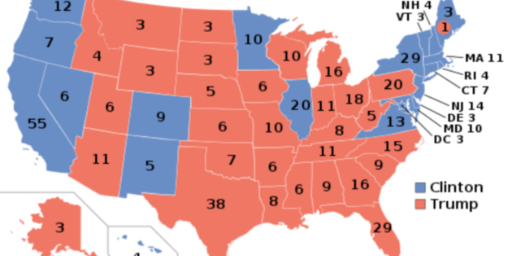Non-Majority Presidents
Are plurality winners less legitimate than popular vote losers?

Earlier this morning, in my post on the “Independent State Legislature Theory,” I observed,
Democrats have been on a losing streak in a Court that’s dominated by Republican appointees. Add to that the fact that the three most recent additions were nominated by a President who lost the popular vote and that one of those seats was vacant only because Republicans refused to hold hearings on a Democratic appointee, it’s really hard to Democrats to accept the rulings as motivated by anything other than partisan politics.
A friend pointed out privately that many Presidents, including Bill Clinton, failed to win the popular vote and nobody questioned the legitimacy of their appointees to the Court. That’s absolutely true.
In the modern era, which I date from FDR’s election, Harry Truman only got 49.55% of the vote in 1948; John Kennedy got 49.72% in 1960; Richard Nixon got 43.42% in 1968; Bill Clinton got 43.01% and 49.23% in 1992 and 1996; George W. Bush got 47.87% in 2000; and Donald Trump got 46.09% in 2016 all fell short of a majority. Indeed, Bush and Trump actually had more support than Nixon or Clinton in their first wins.
I do think, however, that failing to get 50 percent of the vote in a contest with three or more major candidates is a different thing than coming in second place in the contest. We hadn’t had a popular vote loser in the modern era until the 2000 election and then repeated it in 2016.
While I benefitted from this, in that my preferred candidate won, in 2000 and felt its pain in 2016, I considered both Bush and Trump legitimately elected.* The rules were the rules and the Electoral College, anachronism though it may be, was baked into those races from the outset. In 2000, where the margin was roughly a half million votes, I could at least rationalize that Bush might have won a majority had the rules incentivized him to campaign in that way, there was no way Trump could have made up a 3 million vote deficit.
Interestingly, the last four popular vote losers who won the Electoral College were all Republicans: Rutherford B. Hayes (1876), Benjamin Harrison (1888), George W. Bush (2000), and Donald Trump (2016). The first and only other person in this category is John Quincy Adams (1824) from a different party system; indeed, the three other candidates in that race were all members of the same party as Adams, the Democratic-Republicans.
Does this matter? I think so.
The sense that the deck is permanently stacked in favor of one party makes legitimacy hard to sustain. Three million votes is a lot even in a country as large as the United States. Even with almost 129 million voting for either Clinton or Trump, the margin was over 2%.
And, of course, it’s not just that Trump got to govern instead of Clinton for the 2017-2021 presidential term. He got three lifetime appointments to the Supreme Court that have already had major impact on our public policy, all of whom Democrats, not unreasonably, think should have been appointed by their Presidents.
I’m more of an institutionalist than most. The Electoral College is an anachronism. It’s not only a compromise solution to a set of disputes that existed in 1787 but hasn’t operated as intended since the early 1800s. Unless we can amend the Constitution to change it, we’re essentially** stuck with it. But it’s an exceedingly undemocratic way to choose far and away the most powerful player in our government.
____________
*Yes, there were attempts by Russian actors to influence the election in Trump’s favor and some attempts by his campaign to court that influence. There’s just no way of knowing how much that mattered.
**I and the late Doug Mataconis have written about the National Popular Vote interstate compact quite a number of times over the years. I’m skeptical it survives SCOTUS scrutiny if it ever passes into law.






I can understand an argument about the superiority of an absolute majority winner over a plurality winner, but it seems (and I do not know who brought this up to you or why) that when people point out that many US presidents are plurality winners they seem to be doing so in a way to nuddle the waters on the EC and/or straight up defend second place presidents.
It makes no sense, as it is an assertion that having the second most amount of support and being allowed to govern is not that different than coming in first but by plurality. Such assertions are simply wrong.
But, I have seen the “argument” before.
Quite frankly, I think a lot of people have never much thought about what a “plurality winner” is (or, really, about electoral mechanics or general, let alone the fact that there are different ways for elections to be conducted).
For me, one of the worst aspects of the EC system is that all major candidates can basically ignore more than 1/3-1/2 of the country – California & New York, plus all of the various Dakotas, Mississippis, and other states that are non-competitive.
To have huge segments of the country disenfranchised (there are more Republicans in California than in any other state), certainly feeds a sense of illegitimacy.
In a (probably vain) attempt to head off a debate that devolves into an argument over definitions, I’m going to put it up front. There are two applicable definitions of “legitimate” here:
1) accordant with law or with established legal forms and requirements This definition is essential synonymous with “legal” and I concede right at the outset that both Bush and Trump were legally elected as President.
But there is another definition:
2) conforming to recognized principles or accepted rules and standards I take this definition as separate from “legal”. Something can be legal, but not legitimate. This is how I view legitimacy and by this definition I don’t view any of the second place presidents as legitimate.
@Tony W: Meh. I’ve lived in a state that’s mostly ignored for Presidential politics all of my life. The fact of how the parties are made up and the disingenuousness of conservatives as they acquire power–“deficits don’t matter” and such–was far more disenfranchising for me. The fact that the circus never comes to town is something you can’t miss unless you’ve been to the circus.
@MarkedMan:
I consider Trump in 2016 to have been legitimately elected. Bush, in 2000, was not. It’s not that Bush lost the popular vote that made his election illegitimate, it was that his EC victory was tainted by the Florida debacle.
I hate the EC as much as the next guy, but for better or worse, it’s the system we have now. It dominates the entire way the campaigns are run, and it affects voter behavior itself (as residents of swing states have more incentive to vote than those in non-competitive states). In fact, it’s somewhat of a misnomer to say Al Gore or Hillary Clinton would have won if the election were based on popular vote. There’s no way to know for sure, because they didn’t run in a popular-vote-based system to begin with.
As long as have a system based on the EC, then I consider EC winners “legitimate” as long as the EC process was followed fairly.
Californian here. Politically, in terms of national elections, California exists as a fundraising ATM for both parties.
@al Ameda: Well, there is that. They do come to town to pander for that purpose, I suppose.
Then they spend all of our money in Ohio and Florida.
Yes, a second place president is illegitimate. A first place president who wins a plurality of votes is legit — but a product of a flawed system.
The electoral college, and, much more importantly, the deliberate malapportionment of the U.S. Senate, means that the American federal government lacks democratic legitimacy. It must be changed. The only three solutions are a peaceful political change that restores electoral legitimacy, a revolution or civil war, or secession. I would like to see the first solution as a purely practical matter, but I doubt we’ll see that.
(And frankly I don’t care that “the system was designed like that.” The framers were as a whole, very smart and very brave (and very lucky). They were not political Jesus.)
There are a lot of standards for what constitutes electoral legitimacy in a political system. But no system that gives a Californian’s vote 1/76 as much weight as a resident of Wyoming (which is about what it works out to wrt the U.S. Senate) can be called democratic.
The bare standard for electoral legitimacy is that every citizen is treated equally and has at least de jure equal political power.
It’s like the difference between law and justice. Not everything legal is just, and not everything just is legal. Law is a construct of civilization, a few thousand years old; a sense of justice goes all the way back to wandering primates on the savannah.
People understand at an intellectual level that we have a system and we have to respect that system, but they feel that a president should be chosen by a majority.
Given the closeness of the election, it is pretty safe to estimate that as “likely more than enough”
@Kylopod: Yes, these people were elected according to the EC rules and that makes them legally elected. But in my opinion it doesn’t make them legitimately elected. The EC was a tool created for a specific reason and did not adequately fulfill that purpose and for the past two centuries has only served as a mechanism for people without legitimacy being installed in the presidency.
There was one rationale for the EC to exist: if a terrible mistake was made by the voters, then the electors could have overturned the results. The fact that they didn’t do that for Trump in 2016 showed that one potential benefit was a pipe dream.
Does legitimacy come from the people or the institutions?
Trump (and Bush, and Clinton) clearly had at least a grudging-consent of the governed, as they were not thrown out in a populist uprising and led to the gallows, so there’s that.
@MarkedMan:
Was that one of the rationales? As I recall, there originally wasn’t much of a “popular vote” to speak of, as most states received their electoral votes from the state legislatures (and even states with a popular vote often didn’t reliably record the votes). In fact, it wasn’t until the late-19th century that all states abandoned this practice.
The original purpose of the electors wasn’t to overturn a popular result–as there was no popular result to overturn–but to be a substitute for it.
@Gustopher:
I have to assume that’s snark. Yes, those presidents indeed had “consent of the governed,” if that’s defined as lack of willingness on the part of US citizens to get their ass whupped in a quixotic revolt against the most powerful military in the world.
@Kylopod: 50% snark. The system broke, but the vast majority of people were more interested in keeping the system than dealing with the unknowns of tearing down the system.
People will accept some degree of injustice and illegitimacy in the name of stability.
And so far as the most powerful military in the world goes, we didn’t even have someone make a serious effort to assassinate any of those presidents. (Not sure there were any nonserious attempts either).
@Gustopher:
I don’t think we really can make that judgment, since the security around presidents has vastly increased since Hinckley. There have been multiple assassination plots against 21st-century presidents, they’ve just mostly flown under the radar because the feds pounce on them before they have a chance to get anywhere. I don’t think Hinckley or Oswald or the two women who shot at Ford would have gotten as far as they did under current security.
I also should note that if you look at the history of assassination attempts (successful or otherwise), a lot of them aren’t based on some rational political goal, but are just a crazy person with some very esoteric motivations. The Hinckley case was bizarre, but it wasn’t uncommon. (It was influenced by the character from Taxi Driver who was himself partially modeled on Arthur Bremer, another would-be assassin with weird motives.) To have one based on a conventional partisan reason seems even less likely when you consider that killing a president just elevates the vp from the same party, and the party is likely to be helped politically by the event.
The ideas about the plurality presidents is just a distraction. Someone mis-types and they say a majority of votes and someone jumps on it to point out a lot of presidents didnt have the majority of votes. But, that is the norm in much of the world. Lots of places where people form governments without having the majority of votes and lots of ways to do it. What is uncommon is that the person with many fewer votes wins. And it keeps happening. Then that party with fewer votes gets to appoint the 3rd branch of government to lifetime appointments so the effects of the second place vote getter winning last for 40 years.
Steve
@Michael Reynolds:
If they really felt strongly enough about that, it would probably be fairly easy to fix–provided that they wanted to elect representatives who shared their “feelings.” But I suspect that most voters really feel that they only care about the majority ruling when they (aka their team/side/cult) are in the majority (aka win).
@steve: I largely agree, but I think whenever people decry plurality wins in the US, what they usually have in mind is the Perot Myth–the debunked but still widespread belief that Clinton’s election in 1992 owed itself to Perot splitting the Republican vote. Of course there have been a number of other presidential elections in which the winner failed to break 50% in the popular vote. But 1992 still dominates a lot of political junkies’ thinking about this issue, as it’s the most recent example where the winning candidate won a plurality but not majority of the popular vote, and the only example since 1968.
In principle, I do agree that the spoiler effect raises questions about democratic legitimacy, and it’s one of the reasons why I’m in favor of ranked choice. Even though plurality systems are common, and such victories have happened quite frequently in our own history, I don’t think it’s an ideal way to hold elections. And it can’t totally be separated from the EC issue, either: in both 2000 and 2016 the state victories that pushed Bush and Trump over the line were mostly plurality victories.
@Kylopod:
Correction: Clinton’s 1996 victory also was this, with Perot again getting a substantial though much smaller share of the vote. But it doesn’t change my point.
@Kylopod: however you want to slice it, Democrats weren’t trying to overturn the 2016 election, even though it was a minority win — it was close enough, and within the system, and institutions provide stability.
Meanwhile, Trumpers did try to overturn the 2020 election, despite losing.
We grudgingly consented to be governed by Trump in 2016.
If a state replaces electors in 2024, and the institutions are undermined further, I don’t know that Democrats will acquiesce. There’s a degree of illegitimacy that we accept, but probably not infinite.
——
Also, Mara Lago provides a number of potential security holes. The omelet bar gives an employee access to kitchen implements a few feet from Trump. They can plug lots of holes in security (only nylon spatulas there, omelets are prepared by secret service, etc), but it’s a very large surface area for attacks, and they have to cover them all.
@Kylopod: I meant that more in the sense that because of the history you discussed, there was a potential for electors to correct a horrendous mistake when they cast their ballots. Back in the day that mistake could have been mad by the state legislators that send them, in our time it is the popular vote.
@Kylopod:
There is a brilliant, but sadly rarely performed due to the subject matter, Sondheim musical called Assassins that is entirely based around exploring this theme.